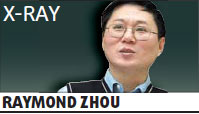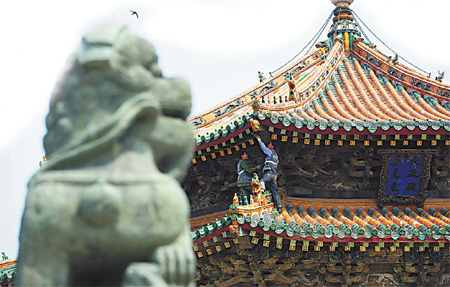 In martial arts stories, a young man overcomes all kinds of hardship to get something. It could be an ancient scroll, or a sword, or simply a title. Once he has it he has all the power in the world and it will kowtow to him.
In martial arts stories, a young man overcomes all kinds of hardship to get something. It could be an ancient scroll, or a sword, or simply a title. Once he has it he has all the power in the world and it will kowtow to him.
Tourist attractions in China also strive for such a holy grail. It's called a "World Heritage Site" listing and is granted by the United Nations Educational, Scientific and Cultural Organization, more commonly known as UNESCO. With a plaque bearing the title, the place will reap tourist yuan.
Just this week, it was announced that Mount Wutai has made the cut, becoming the 38th Chinese site so honored. On the other hand, Mount Songshan failed to get into the last round of competition, which means it'll be a few more years before it joins that exclusive club.
If I had a chance to console Shi Yongxin, abbot of Shaolin Temple, nestled in Mount Songshan, I'd tell him: "Don't be sad. That title means nothing to you. You already have everything the title can bring. Let the minor players duke it out for it."

A place is designated as a World Heritage Site, according to UNESCO, to protect its natural and cultural value. It implies it is "endangered" and should receive special care. In its promotional material, the World Heritage List is also called the "Danger List".
This has been interpreted by many local officials in China as "the list for development". I've visited more than half of China's sites on the list, some right before they got the title, some shortly after and others when the shouting had all died down. They all share one thing: Tourism takes off like a rocket with what UNESCO calls the "inscription".
The only other status-elevator that rivals this "inscription" is something inscribed by the emperor, in his own hand. If it existed but was destroyed by the fires of war or the passions of the "cultural revolution" (1966-76), it can be recreated. But you cannot make something like this up. It has to have a real historical basis.
The importance attached to having a UNESCO title is derived from the traditional Chinese notion of hierarchy. Each city has a list of places you have to see before you die, above that is the province list, then the national list of attractions. To top it off is the UN list, which will be at the top of the pyramid until such time as star ships launch seven-day tours of the solar system and beyond.
I have talked to many officials desperate to get on this bandwagon. "People here are very poor. They need something to lift them out of poverty. This place is landlocked. No investor would come. But if we are endorsed by the UN, tourists would come by planeloads and busloads and people can get rich quick by selling trinkets," they argue.
UNESCO does not forbid tourism. It requests that if tourism grows it does not do so at the expense of the ecosystem, which is fragile in the first place. Local officials also emphasize protection, but adopt a different approach: "We want to protect our heritage, but how can we go about it without money? And the best way to raise money is through tourism revenues." With money, they can persuade local residents to give up logging for cooking and heating. Local kids can ride the bus instead of walking for miles to get to school. Adults can get jobs as park workers.
While in Yunnan, I was once caught in the crossfire between a conservationist and a growth-first pragmatist. I was their mutual friend. They were debating the pros and cons of building dams along an important waterway. As you may have guessed it, the one who wanted to improve the lives of local citizens by developing local industry was born in a village near a dam, and the one who wanted to keep the pristine beauty of the land was from Beijing. Both were ardent, and both had valid points.
